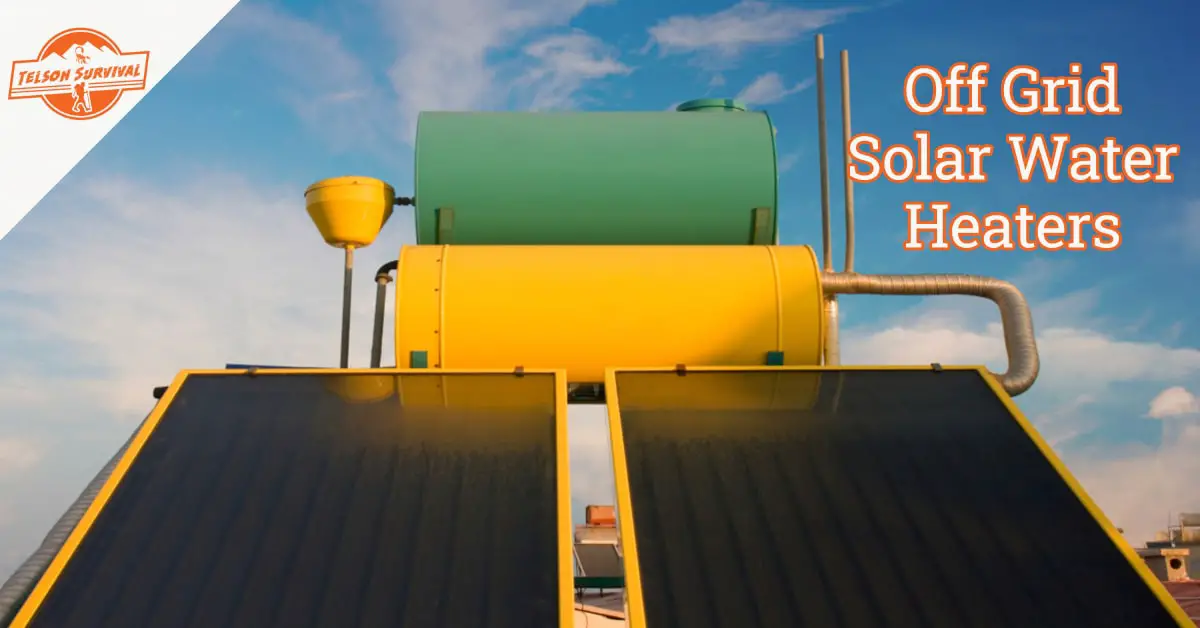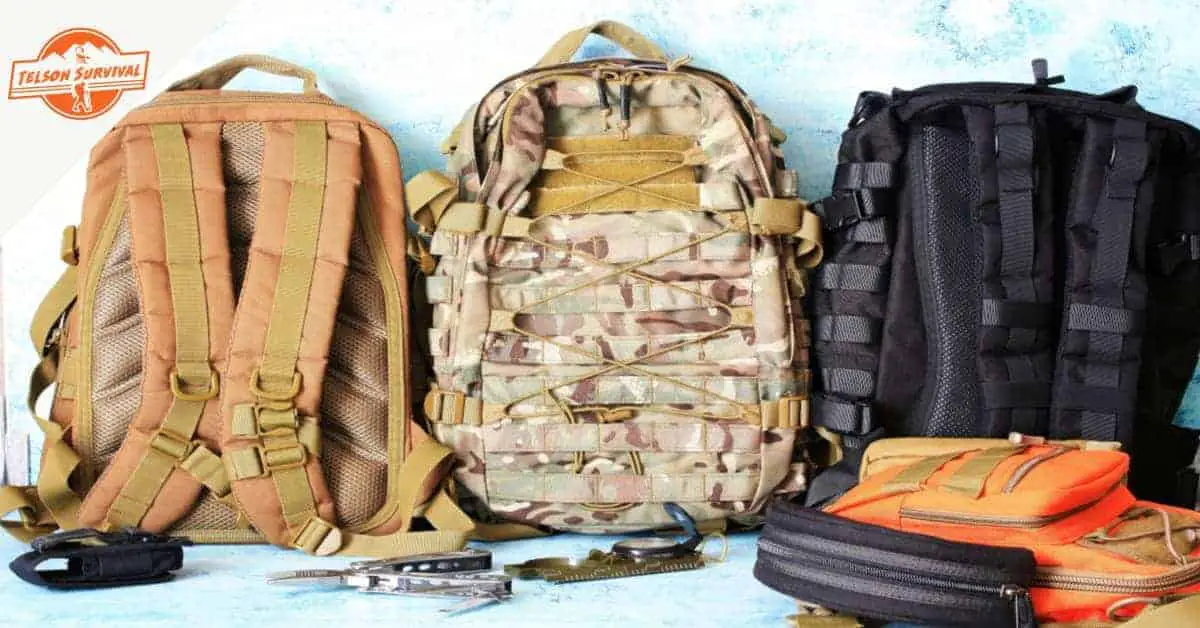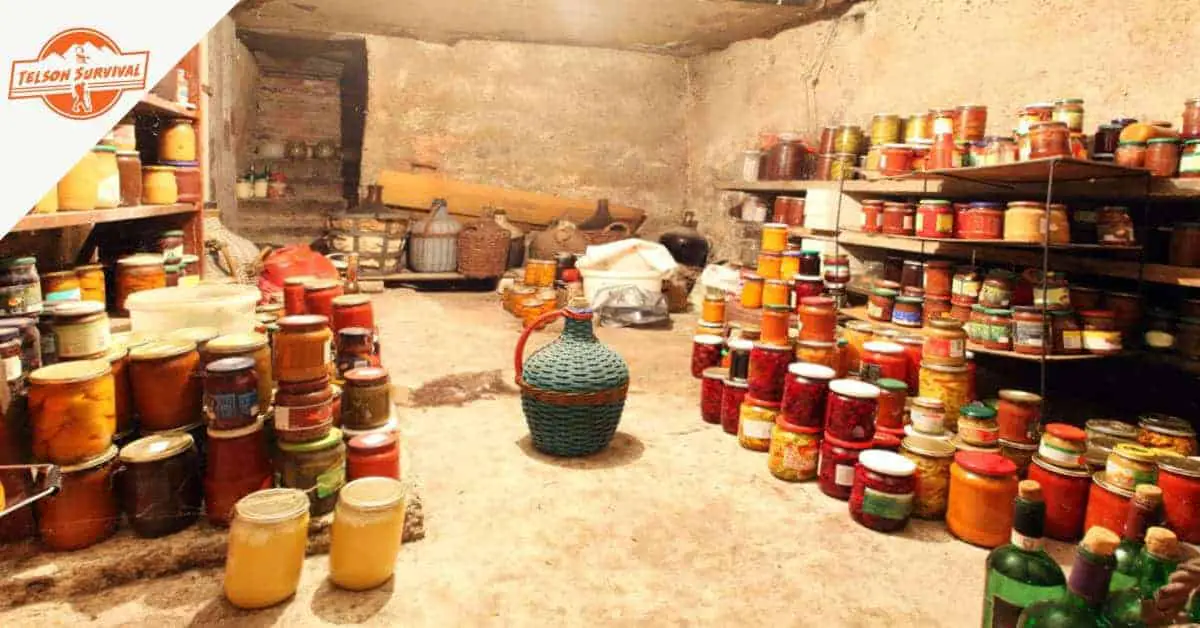Most off grid homesteaders and preppers want a life free from the hefty bills of public utilities. But that does not mean they want to forego their refreshing morning or evening hot shower and the pleasant feel of warm water on their hands when doing dishes. Off grid solar water heaters could just be their reliable and cheaper hot water supply solution.
What are off grid solar water heaters?
Off grid solar water heaters are high-efficiency appliances that harness solar energy using solar collectors to directly heat water. Depending on their type, your solar water heater can have a storage tank, use a heat exchanger, or heat water on demand.
A common characteristic of all solar water heaters is that they work by thermal energy. This means that, unlike standard solar panels, solar water heaters do not convert solar energy into electricity before using it to heat water. Instead, the sun’s radiation heats the water directly.
These are all the types of off grid solar water heaters we will be covering in this article:
- Active Solar Water Heaters
- Active Direct-Circulation Solar Water Heaters
- Active Indirect-circulation Solar Water Heaters
- Passive Solar Water Heaters
- Passive integral collector solar water heaters
- Passive Thermosyphon solar water heaters
- Flat-plate glazed solar water heater systems
- Flat-plate unglazed solar water heater systems
- Panel solar water heater systems
In a hurry? If you just want to get to our conclusions, here are our top picks and recommendations!
Last update on 2025-01-14 / Affiliate Links / Images from Amazon Product Advertising API
Do off grid preppers need a solar water heater?
Preppers have several options for heating their water while off grid. These include the use of wood or other fuels like propane.
But using wood can be cumbersome as you’ll need to first find it and then burn it to heat water in a pot before using it in a bucket for your bath, which may not be what you are looking for.
Using propane is efficient but costly. Besides, it means going back to paying more for energy to heat water as when you were connected to the municipal supply.
So, off grid preppers need a solar water heater because it is, first and foremost a cheaper option. According to ENEGY.GOV, installing a solar water heater will reduce your water-heating cost by 50%-80%.
How much your water heating cost reduces with solar heaters will also depend on these factors:
- How much hot water you use.
- Where your off-grid home is located and the amount of solar energy available at the location.
- The efficiency of your solar water heating system.
- The availability of financing and incentives (credits and refunds).
- The cost of other water heating fuels (whether they are cheaper or more expensive than the solar option).
We’ll tell you about several other advantages of using solar water heaters plus a few disadvantages later. But first, we explore the best options for off grid solar water heaters.
Best Off Grid Solar Water Heaters For Preppers
There are two major types of solar water heaters: active and passive. Active solar water heaters use circulating pumps and controls while passive solar water heaters don't.
Each of the two types of solar water heaters has subtypes. We’ll mention the subtypes and describe the best off grid water heater for each type.
Active Solar Water Heaters
Apart from using circulating pumps and controls to circulate heated water from solar absorbers/collectors, active solar water heaters are the best for colder regions as the heated water is stored in a tank that can be installed indoors to preempt freezing.
There are 2 main active solar water heater subtypes:
- Active Direct-Circulation Solar Water Heaters
- Active Indirect-circulation Solar Water Heaters
Active Direct-Circulation Solar Water Heaters
With direct-circulation solar water systems, water from a storage tank is pumped into collectors made of metal or glass tubes. The water is then heated in the collectors and sent directly to your showerhead or kitchen faucet.
Active Indirect-circulation Solar Water Heaters
With indirect-circulation solar water heaters, a non-freezing heat transfer fluid such as propylene glycol is pumped and heated within the collectors. The heat is then transferred to the water supply using a heat exchanger and then sent for use in your home.
Best Active Solar Water Heater: Duda Solar 200 Liter Water Heater
The Duda Solar 200 Liter Water Heater is an active (indirect) split system, meaning it has a water storage tank separate from the solar collector.
The solar water heater is optimal for cold climates since it is made to be winter-resistant.
Key features and considerations of the Duda Solar 200 Liter Water Heater:
- Comes as a complete set with 20 Duda solar vacuum tubes, a stainless steel water tank, a controller, and a pump.
- The system uses a copper heat exchanger coil on the upper part of the tank so that the water being used is heated at the top and the cold water stays at the bottom.
- The solar collector has 20 14mm solar tubes on a 45-degree stand (you can opt for a 37-degree stand or a slope-roof stand).
- Has an automatic air vent for removing air from the top of the tank.
- Uses a water pump immersed in the tank.
- Includes a thermostatic mixing valve for safety and prevention of scalding.
- It is SRCC-certified (Solar Rating & Certification Corporation).
- It can be used to obtain 30% federal or state tax credits and exemptions.
Last update on 2025-01-14 / Affiliate Links / Images from Amazon Product Advertising API
Duda Solar 200 Liter Water Heater main strength:
- Quick water heating with the 20-tube solar collector under direct sunlight.
Duda Solar 200 Liter Water Heater main limit:
- Leaving the system without water usage for days can cause overheating and damage to the solar heater.
Passive Solar Water Heaters
Instead of using pumps, passive solar water heaters rely on convection (molecular motion) to make heated water rise to the surface and the cold water sink to the bottom. That way, the hot water is sent to your faucet without needing to be pumped.
As with active solar water heaters, there are 2 main subtypes of passive solar water heaters:
- Passive integral collector solar water heaters.
- Passive Thermosyphon solar water heaters.
Passive integral collector solar water heaters
An integral solar water heater, also known as a batch water heater, has a large water storage tank that serves as a solar collector at the same time. The tank has an inlet pipe at the bottom that feeds in cold water from your house plumbing and a top outlet pipe.
Once you open the faucet in your home, the pressure moves the cold water to the bottom and the hot water to the top of the collector tank, then through the top pipe to your home.
If you are looking for a cheaper off grid solar water heater, integral collector solar water heaters are what you should go for. They have a simple low-cost design and are most popular in the warmer tropical areas where they are used during summer and drained in winter.
Passive Thermosyphon solar water heaters
Thermosyphon solar water heaters are the most popular solar water heating systems. They have a storage tank and a metal flat plate solar collector. The storage tank is installed above the solar collector because the no-pump system works on the principle that heated water rises.
These systems can either be open loop or closed loop.
Open-loop Thermosyphon solar water heaters heat water directly inside a flat-late solar panel/collector. The collector is connected to the bottom of the storage tank so that heated water is transferred to the tank.
One disadvantage with open-loop Thermosyphon solar water heaters is that they are prone to blockage by hard water as well as to freezing. So, if you live in extremely cold climates, the closed-loop option may be better.
Closed-loop Thermosyphon solar water heaters use an antifreeze chemical inside a heat exchanger that transfers heat from the solar collector fluid to the water in a tank.
Whether you use an open or closed-loop Thermosyphon system, the water storage tank has to be well insulated to minimize heat loss, especially during the night when temperatures are lower.
Best Passive Solar Water Heater: Sunbank 40G Solar Water Heater
The Sunbank 40-gallon solar water heater is designed to help you save money by utilizing free solar energy while enjoying the efficiency of a good water heating system. With its 40-gallon capacity, you have all the hot water you need for approximately 3 people daily.
Key features and considerations of Sunbank 40G Solar Water Heater:
- The heater comes as a complete pack with a tank, evacuated tube collectors, and an installation bracket.
- The solar collector is made of evacuated tubes which are 92%-96% effective in the absorption of solar radiation.
- The high-density Polyurethane insulation allows advanced heat retention.
- Easy to install and a good DIY solar water heater for any homesteader or prepper.
- The solar collector comes with a 10-year warranty.
- It is SRCC-certified and is 30% tax-credit and local-refund eligible.
Last update on 2025-01-14 / Affiliate Links / Images from Amazon Product Advertising API
Sunbank 40G Solar Water Heater main strength:
- Low maintenance requirements considering that the heater has no pumps or moving parts and does not use glycol.
Sunbank 40G Solar Water Heater main limit:
- Not as efficient as the active solar heater systems.
Other Solar Water Heater Types
Apart from the active and passive solar heating systems, there are other types that are described in relation to the storage tank and the solar collector. They include:
- Flat-plate glazed solar water heater systems.
- Flat-plate unglazed solar water heater systems.
- Panel solar water heater systems.
Flat-plate solar water heaters
These systems have an insulated solar collector in a weather-proof box that has a dark solar absorber plate under a glass/plastic cover. They are usually used for heating swimming pools in cold weather.
Flat-plate unglazed solar water heaters
Flat-plate unglazed solar water heaters are made with copper tubing on a metal plate and mounted on a sturdy rubber without any enclosure. They are good for heating swimming pools when the sun’s heat is reliable.
Panel solar water heaters
These are a camper’s option for heating water and are perfect to have in a get home bag. They are installed with a low-watt solar panel which is directed in the direction of the sun’s radiation to heat the water in a storage bag.
Best Flat-plate solar water heaters: SunHeater S120U Universal Solar Pool Heater
The SunHeater S120U is a solar water heating choice for survivalists who are specifically looking to heat a swimming pool. The system works by pumping water from the pool, through unglazed tubes where it is heated, and back to the pool as warm water.
Key features and considerations of SunHeater S120U Universal Solar Pool Heater:
- 2 x 20ft black tubes, enough to heat your pool water to 6-10°F.
- Simple to install on roof, ground, or fence where there is direct sunlight.
- Does not need an extra pump but uses the pool pump.
- Suitable for both ground and aboveground pools.
- It is UV-protected to prevent damage by the sun.
Last update on 2025-01-14 / Affiliate Links / Images from Amazon Product Advertising API
SunHeater S120U Universal Solar Pool Heater main strength:
- Easy to install and requires little to no maintenance.
SunHeater S120U Universal Solar Pool Heater main limit:
- You’ll need to buy additional piping to complete the installation.
Best panel solar water heater: ADVANCED ELEMENTS 5 Gallon Solar Shower
This is the perfect solar water heating choice to including in a camper’s prepper gear. The 5-gallon outdoor shower bag will give you the pleasure of a hot shower by simply filling it with water and placing it in the sun with the clear side up.
Key features and considerations of ADVANCED ELEMENTS 5 Gallon Solar Shower:
- 2-layer design for optimal heat retention.
- 4-ply structure with reflector and insulator panels.
- Fitted with a detachable showerhead and a filling valve.
- PVC-free.
- Has a side-pocket for toiletries and a temperature gauge.
- Has a wide handle for a firm grip and easy transportation.
- Has Velcro straps for holding your washcloth.
- Easy to store by simply rolling it up.
Last update on 2025-01-14 / Affiliate Links / Images from Amazon Product Advertising API
ADVANCED ELEMENTS 5 Gallon Solar Shower main strength:
- A portable and easy-to-use option for your bug out bag.
ADVANCED ELEMENTS 5 Gallon Solar Shower main limit:
- The shower head is rather tiny.
Off Grid Solar Water Heaters - Advantages and Disadvantages
Whether you opt for fuel-powered or solar water heaters, you’ll enjoy the benefits of each but still deal with a couple of limits. Here are off-grid solar water heaters’ advantages and disadvantages.
Advantages of off grid solar water heaters
There are many advantages that both the off-grid preppers and homeowners can reap from using solar water heaters. Here are 6 of the most obvious advantages:
- Solar water heaters have a cheaper operating cost. Even though solar water heaters have a fat price tag, once you have purchased and installed your heater, you have zero or minimal operating and maintenance costs. After all, the sun’s rays are free of charge.
- Harnessing solar energy to heat water is environmentally friendly. Solar energy is clean and renewable energy with no contribution to the carbon footprint. As such, using solar water heaters is not just healthy for you, but it is also a noble contribution to the global initiative to reduce environmental pollution from fossil and other carbon-emitting fuels.
- Solar water heaters are easy to install. Unlike solar power systems that need a more complex installation process, solar water heaters are easy to set up and get running. Most of the kits simply require you to connect parts of the kit and your water heating process is ready to go.
- You can save up space with solar water heaters. While you’ll need a few PV solar panels to tap enough solar energy for other home needs, thermal water heating panels take up less space because 1 or 2 panels would suffice for your hot water needs, depending on the number of people in your off grid home.
- Solar water heaters are super-efficient. Ordinary PV solar panels absorb a mere 15-22% of solar energy to convert to electricity. With solar water heater collectors, 80% of the sun’s radiation is readily turned into thermal heat energy.
- Using solar water heaters allows you to claim rebates. Some governments allow you to claim bonuses if you are generating and using your own solar/renewable power. This is meant to encourage more homeowners and off-grid preppers to embrace renewable energy.
Disadvantages of off grid solar water heaters
Despite these advantages, using off grid solar water heaters can also come with a few disadvantages:
- Solar thermal panels are limited to heating water. Unlike solar PV panels that generate electricity for a wide range of uses, energy from solar thermal panels can only heat water directly.
- There’s some minimal maintenance depending on the solar water heater type. Especially if you are using active solar water heaters that have a pump, annual maintenance is required to ensure efficient functioning or any other time the pump or any part malfunctions.
For more solar powered gear for off grid preppers, check out our articles about solar system packages, the best solar generators and the legality of going off grid with solar power.
Solar Water Heaters – Factors Preppers Should Consider
When buying a solar water heater, there are certain qualities you should look for to ensure you are buying the most effective type for your hot water needs. Here are 4 of the most important.
Solar water heater size
The size of your solar water heater (in gallon/liters) should be determined by these factors:
- The number of people using it.
- The purposes for which the hot water is being used. For example, more water will be needed for use in shower rooms than in a kitchen.
- Extra use of hot water (if you have visitors often).
Generally, 15 gallons is a good average estimate of hot water required per person daily. See more details on this later in the article.
Solar water heater type
We discussed the types of solar water heaters earlier. But it’s good to know that when buying a solar water heater, you should bear in mind that each type works best in a particular environment:
- Active direct-circulation systems are best in warm climates.
- Active indirect-circulation systems are good for areas with freezing temperatures.
- Passive integral collector storage heaters are best for warmer climates, day-time hot water use, and households with more than a single person.
- Passive Thermosyphon solar water heaters can work in different types of climates and for long-term use. You can save space by installing them on the roof.
- Flat-plate glazed water heaters are good for heating swimming pools in cold climates.
- Flat-plate unglazed water heaters are good for heating swimming pools in warmer climates.
- Panel solar water heaters are best for camping and other temporary outdoor escapades.
Solar water heater tank type
If you opt for a solar water heater that uses a storage tank, ensure you purchase one that is:
- Able to withstand heat and retain it.
- Well insulated to keep the water hot for 60-72 hours.
- Food-grade quality.
- Coated with material like enamel to prevent corrosion especially by hard water.
Solar water heater eligibility for rebates and tax credits
You can reduce solar water heater costs by utilizing rebates and tax credits. Before making your purchase, review the heater’s eligibility for these benefits. For example, solar water heaters that are Energy Star qualified are eligible for 30% of the installation cost for up to $2000.
How Efficient is an Off Grid Solar Water Heater?
The efficiency of equipment can be explained as the ratio of the output to the input. In solar water heaters, this ratio (Solar Energy Factor) is calculated by dividing the Heat Energy Out by the Heat Energy In.
Solar water heater efficiency = Heat Energy Out / Heat Energy In.
According to ENERGY.GOV, the higher the solar water efficiency figure, the more efficient a solar water heater is. This figure can range between 1 and 11, and efficiency figures between 2 and 3 are more common.
It’s important to note that the Solar Energy Factor alone is not enough to give a complete picture of a solar water heater’s efficiency. According to a study on thermal efficiency and cost analysis of solar water heater, these other aspects should also be factored in:
- Solar collector/absorber design and material.
- The strength of sun radiation (efficiency will be lower in colder regions but can be enhanced by increasing the insulation of the storage tank).
- Storage tank performance.
Since the Solar Energy Factor may seem like a complex statistic for most of us, an easier way to think solar heater efficiency is by considering that solar water heaters convert up to 96% of solar energy to thermal energy to heat water. This is approximately 4.5 times more efficiency in solar energy conversion when compared to standard solar PV panels.
What Size of Water Heater Do I Need for a Family?
The size of your solar water heater should be determined by the size of your household or your hot water needs. So, buy a heater that will provide the gallons or liters of hot water that you (and your family) need daily.
Here are some general guidelines showing the size of the solar water heater (in gallons) that you should go for depending on the number of hot water users.
- 30-gallon solar water heater – 1-2 persons.
- 40-gallon solar water heater – 2-3 persons.
- 50-gallon solar water heater – 3-4 persons.
- 80-gallon solar water heater – 5+ persons.
Do Solar Water Heaters Work in Winter?
Yes. Solar water heaters work in winter. Nonetheless, your solar water heater will be less energy efficient in winter than it is in summer when the solar radiation is stronger.
Because of more cloudy days, shorter sunlight hours, and heavy snow, solar water heaters harness less sunlight to heat your water. But the little sun radiation that passes through these weather conditions still hits the solar collector and is converted to thermal energy. Your water will be as hot as the amount of energy harnessed and the ability of your tank to preserve heat and keep your water hot.
Note that flat-plate collectors are more efficient in harnessing solar energy when sunlight is limited. Evacuated tubes are less effective in similar conditions as they are vacuum-insulated.
Does a Solar Water Heater Work at Night?
A solar water heater does work at night, not necessarily because the solar absorber is harnessing solar energy but because the storage tank is well-insulated and the water maintains most of the heat generated during the day. A responder on ASKINGLOT says with regard: “I learned this from a personal experience using one of these heaters.”
To avoid the uncertainty of a shower that is not as hot as one would want it at night, some people have an electric-boosted solar water heater where the electricity will be turned on to heat the water if the required temperature is not reached by the sun’s energy.
Do Solar Hot Water Panels Need Cleaning?
Yes. Solar water heaters need periodic cleaning to eliminate any form of dirt and enhance their performance. There are a number of factors that can cause your solar hot water panels to require cleaning:
- It’s the hot season and your solar water panel is not getting the natural shower from rain but is instead collecting plenty of dust.
- You have leaves and debris stuck underneath and between the evacuated tubes of your solar water heater.
- You have hard water that is high in mineral content and it’s causing scaling in the tubes and pipes of your solar water heater.
- You have two different types of metal coming into contact and the stronger one is pulling electrons from the other and causing galvanic corrosion.
A different type of cleaning may be required for each of these issues:
- Hosing your solar heater panels is good enough to remove dust if it is loosely sitting on the panel. If there’s plenty of it and it’s stuck to the panel, use a soft brush, broom, or cloth and warm soapy water to eliminate the dirt and rinse it off thoroughly.
- Use a soft broom to sweep out debris and leaves between your solar heater’s evacuated tubes or a fine rod to get rid of those underneath them.
- Use water softeners or pass a vinegar solution through the collector and domestic water loop every couple of years to prevent or remove scaling. If the scaling is on the heat exchanger, use medium-grain sandpaper to remove it.
- When buying solar water heaters, check to see that they are made of non-corroding bronze, copper, or stainless steel metal or that plastic or another non-corroding lining is fitted on plumbing loops and other joints.
How do you service a Solar Hot Water System?
Once your solar water heater is installed, routine maintenance is essential to ensure efficiency and longevity of service. A properly working solar water heater will be less prone to peeling, corrosion, freezing, or scaling and the consequent blockage.
Whereas passive solar water heaters require little maintenance, active solar water heaters need more attention. So every 3-5 years, you or a professional solar heater contractor should check the following elements of your water heater and service, repair, or replace as required.
- Check the plumbing of the solar water heater for blockage or leaks.
- Examine solar heater glazing for dirt and make any necessary cleaning especially during the dry season when no rainwater is doing a natural rinse.
- Check the collector for dirt, cracks, yellowing or shading and repair or clean as required.
- Assess the collector for loose screws, piping, or wiring and ensure any roof perforations for plumbing and wiring are well sealed.
- Ensure the solar water heater’s pressure valve is not jammed or pushed to extreme ends (completely closed or completely open).
- Make sure pipes and tubes are free of scaling (mineral buildup). Adding a descaling agent to the water every 2-3 years or running a vinegar solution through the hot water loop can help clear scaling.
- If your solar water heater uses an antifreeze solution in a heat exchanger, it will need to be replaced periodically. This should be done by a qualified technician.
- Check storage tanks for leaks, cracks, rust, and other signs of corrosion.
Considering that solar water heaters are delicate equipment, involving the services of a professional solar heater expert when carrying out routine maintenance is always the safer option.
If you decide to do any troubleshooting, ensure you check your solar water heater’s user manual for any directions or consult the manufacturer/provider for instructions.
Off Grid Solar Water Heaters Conclusions
When prepping for off grid hot water supply, going for an off grid solar water heater will save you from the high energy costs that come with using energy from a public utility to heat your water.
If you opt for a solar water heater for your off grid hot water needs, always consider these 5 takeaways:
- Solar water heaters are either active or passive: go for active solar water heaters if your off-grid location is in a colder region.
- If you intend to heat a swimming pool, flat-plate solar collectors are your best bet.
- The right size for a solar water heater is the one that meets all your hot water needs and for all the people in the household: consider that an average of 15 gallons of hot water could be needed for each one daily.
- To service your solar water heater, only troubleshoot what you are sure you can handle, otherwise, call an expert to avoid damaging your delicate solar water heater.
- Solar water heaters can be eligible for tax credits and refunds. Check your local government regulations and take advantage of these incentives to reduce (and actually benefit) from using solar water heaters.














